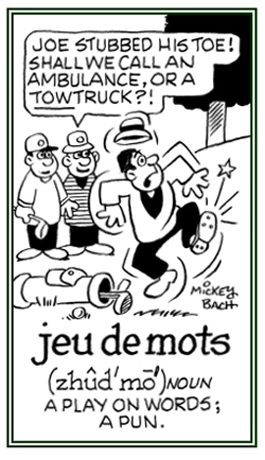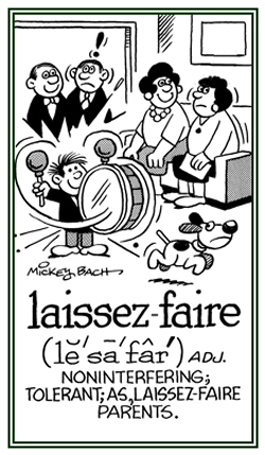Words of French origin
(Many words from French are used in English)
A unit or gathering of individuals united by a common interest or activity: A group of music students from school drove into the large city to attend a concert.
group (verb), groups, grouped, grouping
To gather or to place together people or items bearing similar characteristics: Mrs. Hastings grouped all the math students collectively in the library for intensive tutoring.
A bag, typically made of canvas, a heavy woven fabric, that is carried over one shoulder and used to carry supplies or equipment: The students packed their lunches in their haversacks before setting off for a day's hike in the forest.
An aircraft in which the propulsion is achieved by overhead revolving blades spinning rapidly and allowing the aircraft to go up, down or even sidewise with ease: One of the thrills for a tourist that is featured at the amusement park is to ride in a helicopter over the nearby waterfall.
helicopter (verb), helicopters, helicoptered, helicoptering
To move or be elevated by a vehicle which rises and moves in multiple directions as the result of quickly moving horizontal arms operating above the craft: While the tourists were helicoptering over the desert they were completely intrigued by the size and expanse of it.
1. An extra little dish that is smaller than the main course which is usually served first to stimulate the appetite of those who are eating the primary meal: Tim's mother served him and the rest of the family a bowl of hors d’oeuvres, or vegetable soup, before the fried chicken with mashed potatoes and gravy.
2. Etymology: from French hors, "outside of" + oeuvre, "a job" or "work".
2. Etymology: from French hors, "outside of" + oeuvre, "a job" or "work".
A deadlock or dead-end in a situation from which there appears to be no escape: The peace negotiations between the two nations appeared to be at an impasse with no further meetings scheduled.
A scheming, a secret plotting, and undercover manipulations: It is obvious that politics is an area which has many intrigues of cabal and double-dealings to achieve a politician's objectives.

© ALL rights are reserved.
Go to this Word A Day Revisited Index

Go to this Word A Day Revisited Index
so you can see more of Mickey Bach's cartoons.
A chemical substance that is dark-coloured, often used for medicinal purposes and in photography: The pharmacist prepared an antiseptic solution, or tincture, of iodine to use on small cuts.
1. jeu d'esprit (zhuh duh-spree) (s) (noun), jeux d'esprit (pl)
A witty, and often lighthearted, comment or composition: The term jeu d'esprit is a cleverness that is used when writing literature.
2. jeu de mots (zhuh duh moh) (s) (noun), jeux de mots (pl) The humorous use of words or phrases: A jeu de mots is an intelligence game of wits or a general term for charades, puzzles, tongue twisters, quizzes, etc.

© ALL rights are reserved.
Go to this Word A Day Revisited Index
3. jeu de paume (zhuh duh-pohm) (noun) (not countable): Formerly a term for lawn tennis: Jeu de paume, originating in France, is a ball-and-court game, which was placed first with the hand and later with a racquet.
4. Etymology: literally, "palm game".
2. jeu de mots (zhuh duh moh) (s) (noun), jeux de mots (pl) The humorous use of words or phrases: A jeu de mots is an intelligence game of wits or a general term for charades, puzzles, tongue twisters, quizzes, etc.

Go to this Word A Day Revisited Index
so you can see more of Mickey Bach's cartoons.
3. jeu de paume (zhuh duh-pohm) (noun) (not countable): Formerly a term for lawn tennis: Jeu de paume, originating in France, is a ball-and-court game, which was placed first with the hand and later with a racquet.4. Etymology: literally, "palm game".
A widely available plant grown from a bulb of Mediterranean origin which produces long stems with typically bright yellow flowers: Standing on the crest of the hill, Jill was fascinated by the fields upon fields of jonquil bobbing cheerfully in the breeze.
The abbreviated notation of "kilogram", a metric unit of weight of 1,000 grams: The bread recipe called for one kilo of whole wheat flour.
laissez-faire (adjective), more laissez-faire, most laissez-faire
1. Descriptive of noninterference with what someone or others are doing: The government is planning to adopt a policy of laissez-faire intervention with what congress is planning to do with the new tax system.

© ALL rights are reserved.
Go to this Word A Day Revisited Index
The principal of Jim's school has a laissez-faire policy with his teachers when it comes to preparing and presenting their lessons for students.
2. Etymology: from French laissez, "let" + faire, "do"; "let others in trade and industry do as they will, without government controls, a policy of non interference."
Go to this Word A Day Revisited Index
so you can see more of Mickey Bach's cartoons.
1. The link for communication between two or more groups, often a designated individual: Marshall's appointment as the liaison among the branches of the military was applauded and respected.
2. A romantic, often illicit, relationship between individuals: At the convention, two representatives from different photography companies had a short and intense liaison.
2. A romantic, often illicit, relationship between individuals: At the convention, two representatives from different photography companies had a short and intense liaison.
A metric unit of measurement of volume or capacity, equivalent to 33.76 fluid ounces: Sally planned to take two litres of ice cream for the pie party on the weekend.


